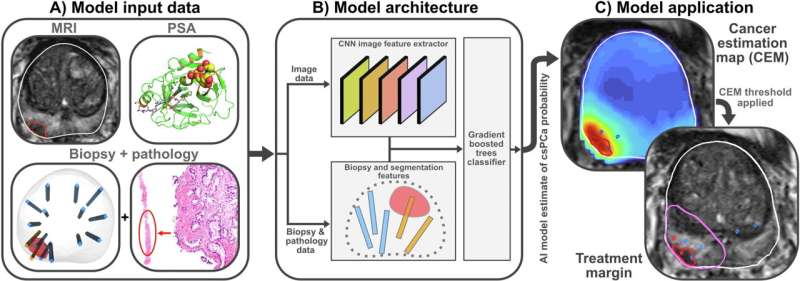This article has been reviewed according to Science X's editorial process and policies. Editors have highlighted the following attributes while ensuring the content's credibility:
fact-checked
trusted source
proofread
AI model could help improve outcomes of prostate cancer focal therapy

A new study shows that an artificial intelligence (AI) model co-developed by researchers in the UCLA Jonsson Comprehensive Cancer Center and department of Urology at UCLA can help doctors determine the extent of cancer within the prostate.
The study was published in the journal European Urology Open Science.
In a series of tests, the AI model was found to be more accurate at predicting tumor margins than magnetic resonance imaging (MRI), potentially improving the effectiveness of focal therapy, standardizing treatment margin definition, and reducing the chance of cancer recurrence.
Focal therapy, a minimally invasive treatment approach used for localized tumors, is an alternative treatment for patients with intermediate-risk prostate cancer. The technique involves imaging guidance, such as MRI, to accurately locate the tumor and guide the treatment. Real-time imaging during the procedure helps monitor the treatment progress and ensures the precise delivery of energy to the intended area.
Current methods, however, can underestimate the extent of prostate cancer, complicating the definition of focal treatment margins. AI has the potential to better define these margins than MRI alone, a crucial factor in ensuring accurate diagnosis, precise treatment planning, and effective surgical procedures.
Working with scientists at Avenda Health, the research team used biopsy data from multiple institutions to train the AI model, called Unfold-AI, to define margins during focal therapy. Testing was then conducted in an independent dataset of 50 patients who had radical prostatectomy for intermediate-risk cancer at the Stanford University School of Medicine. The team found the AI model was more accurate and effective at predicting tumor margins than conventional methods.
The advancement is an outgrowth of research initiated in 2009 by Dr. Leonard Marks, professor and deKernion Endowed Chair in Urology at the David Geffen School of Medicine at UCLA. The software has the potential to help surgeons predict extension into the capsule of the prostate, help radiation therapists boost energy delivery to most important spots, and improve the results of focal ablation of prostate cancer.
The study's first author is Alan Priester, Ph.D., assistant project scientist in the department of Urology at the David Geffen School of Medicine at UCLA. The study's senior author is Geoffrey Sonn from the Stanford University School of Medicine. Other UCLA authors include Marks and Shyam Natarajan.
More information: Alan Priester et al, Prediction and Mapping of Intraprostatic Tumor Extent with Artificial Intelligence, European Urology Open Science (2023). DOI: 10.1016/j.euros.2023.05.018



















